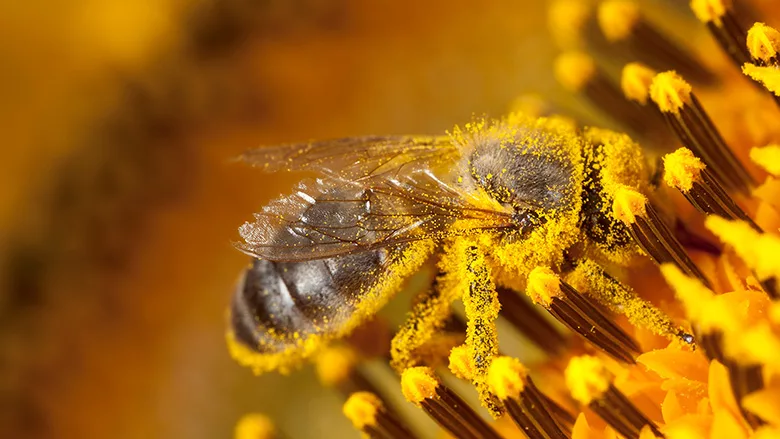The Five Different Types of Pollinators at Your Restoration Business

Photo credit: JLGutierrez / E+ via Getty Images
Anyone who knows me even moderately well knows that an afternoon basking in the sunshine on my back porch recharges me in ways that few other things can. A little music, some good friends, and maybe (just maybe) an adult beverage.
This past summer, while enjoying my respite, I had a visitor. A huge black and yellow bumblebee hovered around in the garden, bouncing from flower to flower, unknowingly doing Mother Nature’s good work. The science geek in me wants to jump straight into anther and stigma, but I’ll spare you the details and simply state that without the work of the bee, moving pollen from place to place and spreading the seed, my flowers and yours would cease to thrive.
What is true in nature is also true in business — we need a pollinator bouncing around from place to place, doing the good work, for a business to thrive.
In my experience with businesses small and large, I have noticed the existence of a few different types of pollinators. Let’s name five different types, determine how you can identify them in the people you work alongside, and find ways to help them as they do their “good work.”
The Natural Pollinator
These folks are the easiest to recognize, but also seem to be the most difficult to find. They appear to effortlessly move around in the business and help to make things work. From the board room to the front desk to the sales calls and into production meetings, the natural pollinator is able to make things happen and get results.
Careful now, I am not saying that this person is a jack of all trades or an expert in every facet of the business, but they understand how to step in at the right time, in the right way, to help the team reach their destination. Oftentimes, we can’t readily determine what sets them apart from others and makes them so successful. But if you have a natural pollinator working in your business, you know it and you work to keep them.
The natural pollinator makes logical connections, seems to always be one step ahead, and completes work without overbearing effort. Not always striving to be the smartest person in the room, they lend expertise when it is needed — they coach, they mentor, they teach, and they can work alongside others to reach a pre-determined goal. At times, they may appear like a purposeful and intentional chameleon, serving when and how they are called upon. Like I said, when you have one, you work to keep them.
The Reluctant Pollinator
You have seen this person. You’re in your third meeting of the day, and you know your colleague has an answer to the question at hand — one that would move the business in a positive direction—but they aren’t talking. The moment passes and the meeting ends without resolution. Why? What prevented the reluctant pollinator from doing their work?
They have the skills but are hesitant to use them. The list of reasons for this behavior is far and wide: fear from past rejection, insecurity in their position in the company, or a shy or introverted personality who has not yet found their voice to name just a few. I sat in this space for years early in my career. It was not until someone else noticed my behavior, called it out, and invited me to participate that I was finally able to figure out how to be a part of the pollination my company needed me to be.
Often the reluctant pollinator will need support and encouragement from a mature pollinator, an experienced coworker, or company leadership to find their place and allow their influence to achieve the desired result. Some groundbreaking and path-shifting ideas are sitting inside the heads of the people around you at work. Say something when you see it. I can name the person who saw something stewing inside of me, asked me about it, and then helped me bring it to the table those first few times. The change you may start in the behavior of a reluctant pollinator can be life altering, not just for the business, but for them personally as well.
The Selective Pollinator
This person has the requisite skills needed to spur innovation and make the business work, but chooses when and where to use these abilities and strengths. It can seem as though they prefer working with this group but won’t engage with that one — almost as if they’re playing favorites. Let’s be honest folks, this one can be frustrating because you know the selective pollinator has the tools to help drive things forward but hasn’t decided whether to use them or not. This part-time use of their skills not only keeps the business from reaching its full potential but also limits the success of the individual.
I have noticed that, many times, the selective pollinator does not realize that they are being discriminatory with their time or skills. With the right approach, they can easily be directed with ways they could be more inclusive in how they do their work.
The False Pollinator
This individual can be tricky to identify and perplexing to work with. They tell you with their words, or perhaps in a resume, that they have the ability to pollinate and move the business forward but, in reality, they lack the needed skills. Oftentimes, the desire is there, so it may be that with training, time, and support the false pollinator can mature to promote good work throughout the business.
The challenge comes in determining whether there is a willingness from this person to put in the time and effort to gain the skills required to begin to see pollination take place. This is a time-consuming process and results usually are not seen in the short term.
The false pollinator will need to slow down their communication and understand how their message is being received by those around them. For a change to take hold and behavior to be modified, this person will need to be able to take an introspective view of themselves.
The Anti-Pollinator
Unfortunately, sometimes you encounter a person in your business who actually works against the pollination process. They can undo the good work done by others or create process roadblocks to keep good things from happening.
Chances are you have been in that meeting and run across this behavior: an idea is presented, a week’s worth of research and preparation has taken place, only to have them shoot down the idea. There are many factors that can lead to this behavior, but once identified as a pattern, it needs to be called out and stopped. An unchecked anti-pollinator can tear down morale within a company.
In my experience, the anti-pollinator does not always intend to be that way, but through fear of the unknown or resistance to change, they take on an attitude that can stop progress in its tracks. It is important to take the time to differentiate between the intentional action and the person who doesn’t realize the damage they are causing.
Just as important to remember is that this behavior is not a permanent state. With the right support, even the staunchest anti-pollinator can modify their behavior such that they become a productive team member. Ask the questions, look for the why, and make sure to determine the motivation before you cast aside and move beyond the person displaying this type of behavior.
Everyone Can Become a Pollinator
In nature, the symbiotic relationship between the bee and the plant is unintentional on the part of the bee. During food gathering the insect moves pollen from plant to plant and unknowingly ensures the survival of the plant. In business, I am not sure the correlation holds.
The pollinator in a business setting is often seen in an intentional act and willingness to move in a purposeful direction to make something better. It is also important to point out that, in nature, behaviors are often hardwired into the DNA and cannot be easily modified or changed. This is not true with people.
What was discussed in the paragraphs above are more commonly behaviors that can be observed in all of us from time to time. With the proper support and encouragement, we are able see people move from a place of inaction into becoming pollinators inside our companies.
As with the bee buzzing around my yard, the work of the pollinator is key in allowing a business to achieve its full potential. Step back from the details of the business and look closely for the pollinators doing the good work in your company. Take the time to figure out what kind of pollinators you have and what type of support they need from you to make their work easier. Coach, train, and encourage the pollinators around you to see growth and life in your business in ways you may never have thought possible.
Looking for a reprint of this article?
From high-res PDFs to custom plaques, order your copy today!









